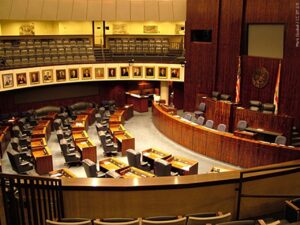
From the history of the United States of America and the Holocaust to the history of African Americans and their experiences with slavery and designating the second week of November as “Holocaust Education Week,” Senate Bill 490 is making room and providing justice to Asian Americans and Pacific Islanders by including their history in Florida’s classrooms.
Underlined in the bill, the history of Asian Americans and Pacific Islanders will be taught in schools. This includes immigration, civil rights, identity, citizenship and culture. Additionally, their contributions to American society will be taught and instruction materials need to include that information. While SB 490 passed its first subcommittee and is now headed to the Appropriations Subcommittee on Education, its companion bill in the other chamber, House Bill 281, is in its first subcommittee.
Assistant director of the Asian American student union at Florida State University, Sharry Solis, was present at the Senate Education Committee meeting when it received its unanimous approval to move on to the next subcommittee.
“I think the bill itself is a very comprehensive bill that will not only help students all around Florida learn about the contributions and stories of the AAPI community, but also alleviate discrimination toward this community as well,” Solis said. “I think with the surge in anti-Asian hate crimes over the course of the pandemic, we need to find concrete solutions to combat this kind of racism and discrimination — and one of the best ways to do so is through education.”
With fingers crossed, Solis hopes this bill will have a positive impact on students in Florida.
“I hope that this bill gives AAPI students the chance to learn about their history and feel represented in United States history, because AAPI history is American history,” Solis said.
Senator Tina Scott Polsky, D-Boca Raton, encouraged those at the first subcommittee meeting to vote no on the bill, claiming it will cause more harm than good.
“Everything we do is hurting public education and hurting our teachers,” Polsky argued. “And we are in a terrible situation where we don’t have enough teachers. We don’t even have enough teachers going into college to become teachers. Those programs are down. And so, what are we doing? We’re making it more uncomfortable to be a teacher. And these people are going to be worried about everything they say.”
Polsky provided an example:
“You can have a disgruntled parent who hates the way the children’s being graded and doesn’t like one little thing that comes out of the teachers mouth and then this teacher is subject to disciplinary proceedings which are vague and make no sense and that’s the worst thing you can do … to have vague statutes that can’t be defined,” Polsky said.
Despite Polsky’s plea to vote down the bill, it passed 9-0.